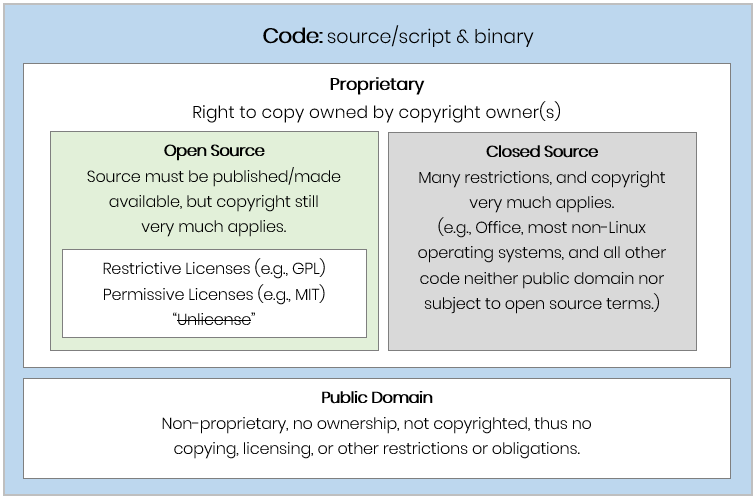Sector 7G's Learning Center
Articles • Tips • Tutorials
OSS License Terminology Quick Reference
Intro
The Hitchhiker’s Guide to SCA and SAST’s “Note on Terminology” reads:
A common but understandable terminology mistake is summarily referring to code that is not open source as “proprietary”. In actuality, any validly-copyrighted work, software or otherwise, is the property of, and therefore proprietary to, the copyright owner(s).
Open source components are copyrighted works, hence the (open source) license. Therefore, referring without context to non-open source licensed software as proprietary, thereby implying open source software is not proprietary, is incorrect and potentially misleading.
The post provides a quick reference for OSS and general software licensing terminology following this diagram:

Public Domain vs. Copyright
Public Domain
Let’s address “public domain” first since it will be quick. First, public domain works, whether it’s code, songs, or books, are nobody’s property. Prevalent software examples include cryptography algorithms (encumbering cryptography algorithms as property is generally not in the public’s best interest; in addition, this refers to the core algorithms themselves, not, e.g., frameworks encapsulating the algorithms).
Since public domain is nobody’s property, right to copy and licensing (taken up below) are inapplicable. Of note, the “Unlicense” terms, which appear in certain repositories and databases, is recognized by the Open Source Initiative, but it is not a license; it merely suggests verbiage designating software as public domain.
Copyright
“Copyright” means “the right to copy” and is a legal area of intellectual property where an original work of authorship is proprietary to (and, therefore, the property of), the copyright owner. The copyright owner isn’t necessarily always the same people or group that wrote the code; copyright assignment from the author(s) to another entity is quite prevalent.
Regardless, any validly-copyrighted work is proprietary and why licensing gets involved to define the terms by which the work may be copied, among many other terms we won’t cover, but which brings us to open source vs. closed source.
Open Source
Open source is a type of license. Yes, terms of most open source licenses are maybe a few paragraphs whereas non-open source licenses fill libraries, but, regardless, every open source licensed code is proprietary. The owners have not relinquished the subject code to the public domain, nor have licensed it under closed source terms.
A note on “copyleft”
Unlike the term “copyright”, “copyleft” has no inherent legal meaning, particularly insofar as a type of intellectual property is concerned. It’s merely a shorthand, and potentially misleading, way to refer to particular open source license terms requiring software using code licensed under certain terms itself be licensed under the same terms. There is additional detail, but that’s the essence, and the most familiar example of “copyleft” terms is likely the GPL. To avoid potentially assuming “copyleft” has legal meaning like “copyright” (most notably, that “copyleft” licensed code is not copyrighted), “restrictive” may be a better choice.
Closed Source
Closed source was essentially the only type of licensing pre-open source whereby source code was not made available, reverse engineering prohibited, copying, usage, and other terms were aplenty and varied, and the license type of course persists today. Closed source is also proprietary since, and again assuming valid copyright, it is the property of the copyright owners. Thus, both open and closed source are proprietary and despite the quite divergent licensing, their terms ultimately remain the only difference.
Final Thoughts (More of a Misplaced TL;DR)
What does copyright mean? The right to make a copy of a work, like a movie, song, or software, over which the copyright holder retains ownership.
Are copyrighted works owned? Yes. Specifically, copyright owners own the right to copy and, therefore, may specify under what terms anyone else may copy it (defined in a license).
Is open source copyrighted? Yes.
Is closed source copyrighted? Yes.
Is public domain copyrighted? No, nor is it proprietary–nobody owns it.
Is “copyleft” not copyrighted? No. “Copyleft” refers to certain types of open source licenses, and licensed software is copyrighted.
DISCLAIMER
Sector 7G Consulting LLC (“Sector 7G”) does not provide, nor should anything from Sector 7G be construed as, legal advice nor the establishment of legal representation or attorney-client privilege. Additionally, Sector 7G strongly encourages review of all licensing with legal counsel.
